
Help! is the fifth studio album by the English rock band the Beatles and the soundtrack to their film of the same name. It was released on 6 August 1965. Seven of the fourteen songs, including the singles "Help!" and "Ticket to Ride", appeared in the film and take up the first side of the vinyl album. The second side includes "Yesterday", the most-covered song ever written. The album was met with favourable critical reviews and topped the Australian, German, UK and US charts.

Worldwide, the British rock band the Beatles released 12 studio albums, 5 live albums, 51 compilation albums, 36 extended plays (EPs), 63 singles, 17 box sets, 22 video albums and 53 music videos. In their native United Kingdom, during their active existence as a band, they released 12 studio albums, 1 compilation album, 13 EPs, and 22 singles. The early albums and singles released from 1962 to March 1968 were originally on Parlophone, and their albums and singles from August 1968 to 1970 were on their subsidiary label Apple. Their output also includes vault items, remixed mash-ups and anniversary box-sets.
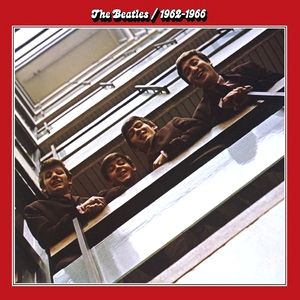
The Beatles 1962–1966, also known as the Red Album, is a compilation album of hit songs by the English rock band the Beatles, spanning the years indicated in the title. Released with its counterpart The Beatles 1967-1970 in 1973, the double LP peaked at number 3 in the United Kingdom. In the United States, it topped the Cash Box albums chart and peaked at number 3 on the Billboard Top LPs & Tape chart while 1967–1970 reached the top spot. The album was re-released in September 1993 on compact disc, charting at number 3 in the UK.
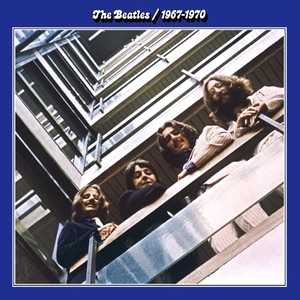
The Beatles 1967–1970, also known as the Blue Album, is a compilation album of songs by the English rock band the Beatles, spanning the years indicated in the title. A double LP, it was released with The Beatles 1962-1966 in April 1973. 1967–1970 topped the Billboard albums chart in the United States and peaked at number 2 on the UK Albums Chart. It was re-released in September 1993 on CD, charting at number 4 in the United Kingdom.

A Collection of Beatles Oldies is a compilation album by the English rock band the Beatles. Released in the United Kingdom in December 1966, it features hit singles and other songs issued by the group between 1963 and 1966. The compilation served as a stopgap release to satisfy EMI's demand for product during the Christmas period, since the Beatles had only begun recording Sgt. Pepper's Lonely Hearts Club Band, the follow-up to their Revolver album, late the previous month. It was the band's first official greatest hits collection, although the Beatles had no involvement in the album.
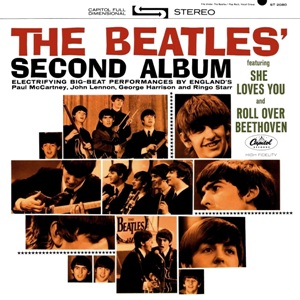
The Beatles' Second Album is the second Capitol Records album by the English rock band the Beatles, and their third album released in the United States including Introducing... The Beatles, which was issued three months earlier by Vee-Jay Records. Following its release in April 1964, The Beatles' Second Album replaced Meet the Beatles! at number 1 on the Billboard Top LPs chart in the US. The album was compiled mostly from leftover tracks from the UK album With the Beatles and Long Tall Sally EP, which are predominantly rock and roll and R&B covers, and rounded out with several Lennon-McCartney-penned non-album b-sides and the hit single "She Loves You". Among critics, it is considered the band's purest rock and roll album and praised for its soulful takes on both contemporary black music hits and original material.

20 Greatest Hits is a compilation album featuring a selection of songs by The Beatles that were number one singles in the UK and US. It was released on 11 October 1982 in the United States and 18 October in the United Kingdom and marked the 20th anniversary of The Beatles' first record release, "Love Me Do", in the UK in October 1962. 20 Greatest Hits was the last Beatles album to be released with variations between the U.S. and UK versions. There is an extremely rare 8 track tape version of this album, which approximately 10 to 15 copies still exist today. Legend has it that Capitol Records decided to pull the plug on the release at the last minute, as 8 tracks were not selling well in late 1982, and all copies were to be destroyed. However, there were a few that survived.
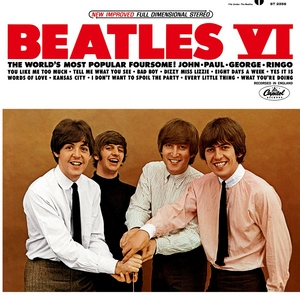
Beatles VI is the seventh Capitol Records studio album by the English rock band the Beatles in the United States and Canada. It was the ninth album released into that market in less than one and a half years. The LP was released in both mono and stereo versions.

"I'm Only Sleeping" is a song by the English rock band the Beatles from their 1966 studio album Revolver. In the United States and Canada, it was one of the three tracks that Capitol Records cut from the album and instead included on Yesterday and Today, released two months before Revolver. Credited as a Lennon–McCartney song, it was written primarily by John Lennon. The track includes a backwards lead guitar part played by George Harrison, the first time such a technique was used on a pop recording.
Music for Pleasure and Classics for Pleasure (CFP) were British record labels that issued budget-priced albums of popular and classical music respectively. Albums were subsequently released under the MFP label in Australia (MFP-A) and South Africa.
The recordings made by the Beatles, a rock group from Liverpool, England, from their inception as the Quarrymen in 1957 to their break-up in 1970 and the reunion of their surviving members in the mid-1990s, have huge cultural and historical value. The studio session tapes are kept at Abbey Road Studios, formerly known as "EMI Recording Studios," where the Beatles recorded most of their music. While most have never been officially released, their outtakes and demos are seen by fans as collectables, and some of the recordings have appeared on countless bootlegs. Until 2013, the only outtakes and demos to be officially released were on The Beatles Anthology series and its tie-in singles and anniversary editions.Bits of some previously unreleased studio recordings were used in The Beatles: Rock Band video game as ambient noise and to give songs studio-sounding beginnings and endings. In 2013, Apple Records released the album The Beatles Bootleg Recordings 1963, which includes previously unreleased outtakes and demos from 1963, to stop the recordings from falling into the public domain.
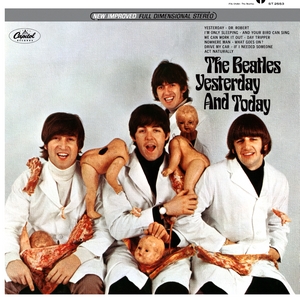
Yesterday and Today is a studio album by the English rock band the Beatles. Released in the United States and Canada in June 1966, it was their ninth album issued on Capitol Records and twelfth American release overall. Typical of the Beatles' North American discography until 1967, the album contains songs that Capitol had withheld from its configurations of the band's recent EMI albums, along with songs that the group had released elsewhere on non-album singles. Among its 11 tracks are songs from the EMI albums Help! and Rubber Soul, and three new 1966 recordings that would appear on Revolver in countries outside North America.

The Number Ones is a compilation album of hits by The Beatles released in 1983 by EMI on the Parlophone Records label in Australia. It is a localised version of the 1982 compilation album 20 Greatest Hits.
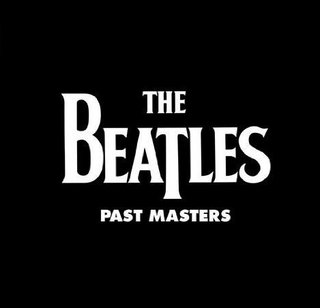
Past Masters is a two-disc compilation album set by the English rock band the Beatles. It was originally released as two separate volumes on 7 March 1988, as part of the first issue of the band's catalogue on compact disc. The set compiles every song released commercially by the band that was not available on the Beatles' 12 original UK albums or the US Magical Mystery Tour LP. It includes liner notes by Beatles historian Mark Lewisohn. The majority of the Past Masters set consists of A- and B-sides from the band's singles, including single versions of songs that appeared in a different form on the band's albums. Also included are the full contents of the UK-only Long Tall Sally EP, two German-language tracks, a song recorded for the American market, and a track released on a charity compilation album.
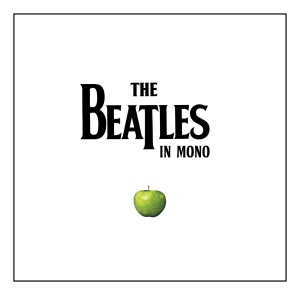
The Beatles in Mono is a boxed set compilation comprising the remastered monaural recordings by the Beatles. The set was released on compact disc on 9 September 2009, the same day the remastered stereo recordings and companion The Beatles were also released, along with The Beatles: Rock Band video game. The remastering project for both mono and stereo versions was led by EMI senior studio engineers Allan Rouse and Guy Massey.

The Beatles (The Original Studio Recordings), also known as The Beatles: Stereo Box Set, is a box set compilation comprising all remastered recordings by English rock band the Beatles. The set was issued on 9 September 2009, along with the remastered mono recordings and companion The Beatles in Mono and The Beatles: Rock Band video game. The remastering project for both mono and stereo versions was led by EMI senior studio engineers Allan Rouse and Guy Massey. The Stereo Box also features a DVD which contains all the short films that are on the CDs in QuickTime format. The release date of 09/09/09 is related to the significance to John Lennon of the number nine.

Released in 1982, The Beatles Mono Collection is a boxed set of all Beatles' albums which were originally issued on mono LPs in the UK. EMI reportedly pressed a total of 10,000 copies of each reissue mono LP for sale individually. An unknown quantity of unnumbered red boxes were issued in the UK, while 1000 numbered black boxed sets were assembled and issued in the United States by the Dutch East India Trading Co. These US sets originally sold for $79.00 and included a numbered certificate and an order blank for additional sets.
Rarities is the name of two separate and unrelated compilation albums by the English rock band the Beatles. The first was released in the United Kingdom in December 1978, while the second album was issued in the United States in March 1980.

The U.S. Albums is a box set compilation comprising the remastered American albums released by the Beatles between 1964 and 1970. The box set was released on 21 January 2014 in the United States, marking the fiftieth anniversary of the Beatles' first trip to the US and first American album from Capitol Records, Meet the Beatles!

Greatest Hits Volume 2 is a greatest hits compilation album by The Beatles that was exclusive to Australia. The album was compiled by EMI Australia to fill in the gap between Revolver and Sgt. Pepper's Lonely Hearts Club Band.


















